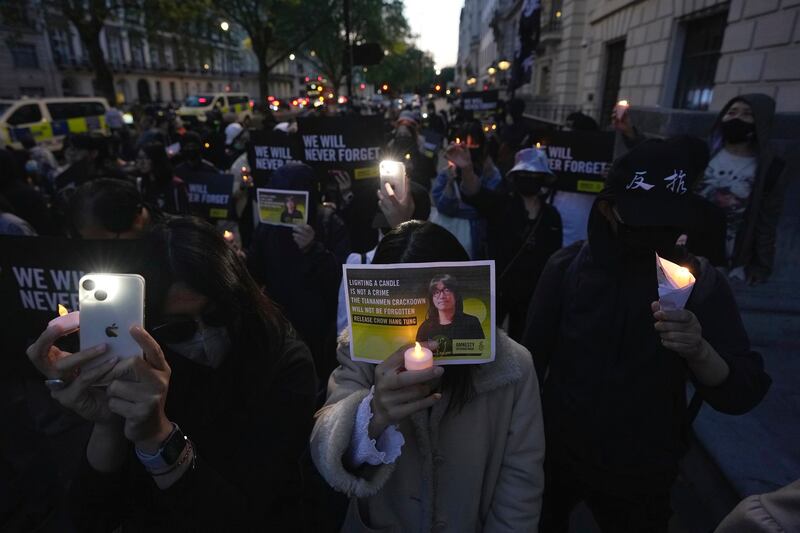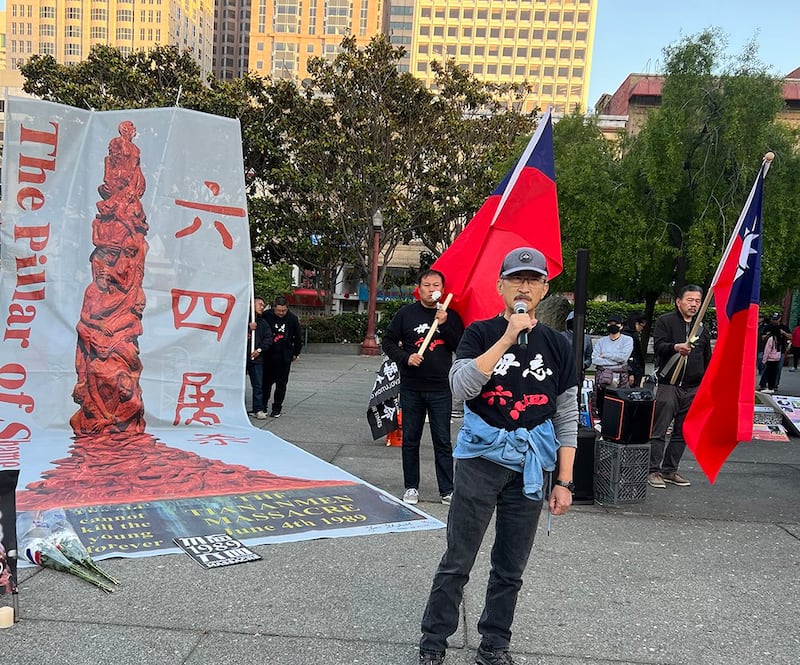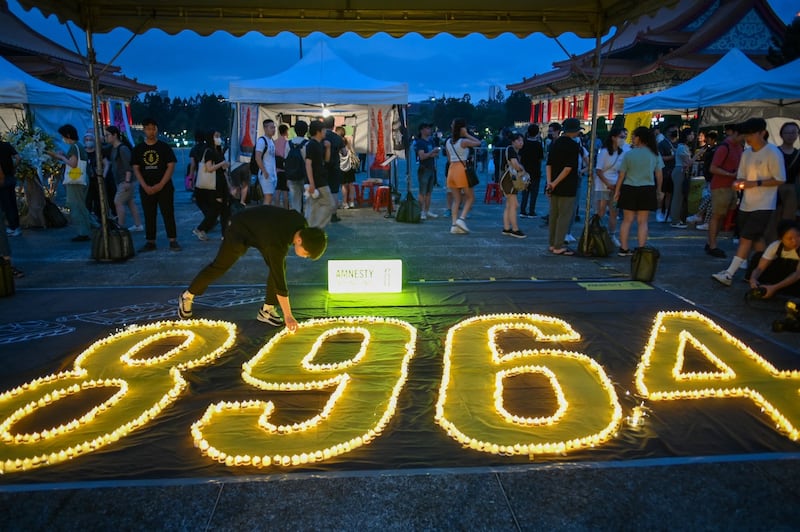Chinese students in Britain, the United States and elsewhere outside their homeland led vigils and rallies over the weekend marking the anniversary of the June 4, 1989, Tiananmen massacre despite threats and potential violence from agents and government supporters.
A group of overseas students in London called the "China Deviants" staged a rally in Trafalgar Square on Sunday, displaying posters and photos of the massacre, alongside plastic tanks and other props.
In actions that imitated the banners, headband slogans brought by the young people who once congregated in their thousands on Tiananmen Square 34 years ago, the students' slogans also spoke eloquently to their own generation in the wake of the " white paper" protests of November 2022.
Some wore headbands styling themselves " the last generation," a meme from the draconian Shanghai lockdown of 2022, while others called for freedom of the press.
The overseas protests came as families of the victims were escorted by armed police and state security officers to a cemetery outside Beijing to pay their respects to those who died in the massacre, and amid tight security on Tiananmen Square itself.
Six members of the Tiananmen Mothers group including Huang Jinping, Yuan Ren and Hao Jian were escorted to Wan'an Cemetery, later posting a short video of themselves bowing in respect at the graves of the victims, clad in black.
"We mark the 34th anniversary of June 4," Huang Jinping, whose husband Yang Yansheng died in the crackdown, says in the video. "On this unforgettable date, we relatives gather here at Wan'an Cemetery in the western suburbs to commemorate the tragic massacre that took place on June 4, 1989."
‘Crushed them with tanks’
The group said in a statement: "Thirty-four years ago today, the government of the day used field troops with machine guns, tanks and armored vehicles to run amok and crush [citizens]."
"They fired live ammunition into the crowd and crushed them with tanks. Our relatives were killed by criminally fired bullets on that bloody night, and sacrificed their precious lives for their ideals."

The tribute came amid tight security in China's capital, and amid an ongoing ban on public mourning or discussion of the massacre.
"I'm in Beijing, and there are facial recognition cameras all around Tiananmen Square," a passer-by surnamed Li told Radio Free Asia on Sunday. "As you pass by, the police yell at you, and they stop you and check your ID."
"The suppression [of public mourning] has been particularly severe this year."
An activist from Hunan province surnamed Tian said some people had fasted for a day in protest at the massacre, following a call for a national day of fasting from jailed dissident Xu Zhiyong.
"People in our group fasted for a day in protest but we haven't been allowed to change our profile pictures [on social media] since last night," he said on Sunday.
Repeated calls to the phones of Tiananmen Mothers members You Weijie and Zhang Xianling rang unanswered on Sunday.
‘If we do not cry out, who will?’
Back in London's Trafalgar Square, protesters of a similar age to the victims were reading out the May 13 declaration made by the students occupying Tiananmen Square in 1989, announcing the start of their hunger strike.
"Our country is in a critical state," the declaration said. "Prices are soaring, official profiteering is rampant, power is concentrated in the hands of the few, and the bureaucracy is corrupt."
"If we do not cry out, who will? If we do not act, who will?" it said, adding: "Democracy is the highest of human aspirations, freedom the innate birthright of all human beings."
"But today these must be bought with our lives."

Many participants stood silently, wearing slogans as headbands, or holding flowers.
"Don't let the truth be hidden in the dust," read the slogan carried by one young woman, who gave only the nickname Chengzi.
She cited the recent "white paper" protests as an inspiration to many of the young people at the rally, who weren't even born when the People's Liberation Army cleared the city center of protesters using tanks and machine guns.
She said that while many present fear retaliation against loved ones back home, or fear for their own safety if their identities are discovered, they still want
March to Chinese Embassy
Another student who gave only the initial M said they had similar feelings, citing the death of pandemic whistleblowing doctor Li Wenliang and anger over the Jiangsu chained woman as motivating factors.
A Hong Konger who gave only the nickname Billy said it was hugely significant for Chinese students to stand up and take part in annual events marking the massacre.
"There are still a lot of people of conscience in mainland China," he said.
Chinese students also marched alongside Hong Kongers, Tibetans and Uyghurs to the Chinese Embassy in London in an annual event organized by Amnesty International marking the June 4, 1989, military crackdown that ended weeks of pro-democracy demonstrations in Beijing and other Chinese cities.
Many held electronic candles and banners in support of jailed Hong Kong barrister and rights activist Chow Hang-tung, who had pledged to fast for 34 hours – one hour for every year since the massacre – to mark the anniversary in prison.

In San Francisco’s Chinatown, hundreds of protesters gathered to light candles and lay floral tributes around a replica of the 1989 "Goddess of Democracy" statue on Saturday evening. Former student leader Feng Congde told them in a speech that the wounds caused by the bloodshed that year weren't only physical.
"The deeper violence [perpetrated by the Chinese Communist Party] was cultural -- it took the form of the thorough brainwashing and propaganda they engaged in afterwards," he said, as participants gathered around a replica of the "Pillar of Shame" memorial sculpture, the original of which has been seized by national security police in Hong Kong.
Former Wuhan student leader Zhao Bingxian said attempts to cover up the truth of the massacre in mainland China would fail.
"The lies they write in ink can't cover up the facts that have been written in blood," Zhao said. "The democratic demands of the students in Tiananmen Square were turned into a massacre of the most barbaric and brutal kind by the Chinese Communist Party."
"Today, we denounce this regime of butchers," he said, amid shouts of "Down with the Communist Party!" "Down with Xi Jinping" and "Long live freedom and democracy!"
No more candlelight vigils
Kory Powell McCoy, a representative of the office of former U.S. Speaker Nancy Pelosi, told the rally that Beijing had only accelerated its atrocities since the events of 1989, imprisoning dissidents who dare to speak out, committing genocide against the Uyghur community, intimidating and destroying freedom and democracy in Hong Kong and threatening democracy in Taiwan.
A U.S.-based Hong Kong activist said Hong Kong can no longer host such vigils since Beijing imposed a strict national security law on the city in 2020, in the wake of the 2019 protest movement against the erosion of the city's promised freedoms.
"Today, 34 years later, we in Hong Kong can no longer light candles, because to do so would already be a violation of the national security law," the activist told the rally.
Instead, protesters on the democratic island of Taiwan appear to have taken up the role once played by the vigils in Hong Kong's Victoria Park, staging a rally marking the massacre at the weekend, but also calling for the defense of freedom and democracy worldwide.

"Taiwan is a democratic country, and China doesn't seem to have reached that point yet," a participant who gave only the surname Ho told Radio Free Asia on Sunday. "I wouldn't want that kind of thing to happen to my own children."
Prominent 1989 student leader Wuer Kaixi, an ethnic Uyghur now based in Taipei, told RFA that June 4 needs to be remembered every year because “we have not forgotten their sacrifices. We have not forgotten the unfinished business that they had started and we're continuing.”
“It is also important to tell the whole world, especially Western democracies, that they have failed to hold the mass murderers of Tiananmen massacre accountable.”
“So commemoration of the Tiananmen massacre basically tells the Western democracies that their China policy is not acceptable in the 21st century,” he said.
With contributions from RFA Uyghur. Translated by Luisetta Mudie. Edited by Malcolm Foster.
